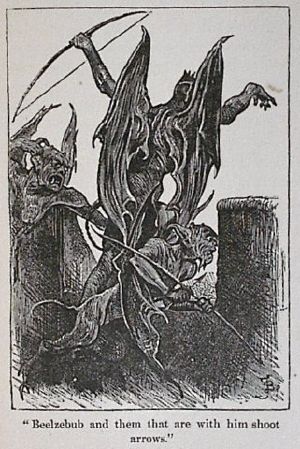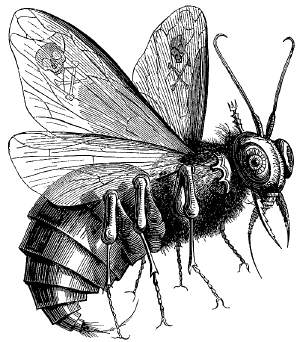Beelzebub
Beelzebub, alsoBa‘al Zebûb or Ba‘al Zəvûv (Hebrew בעל זבוב, with numerous variants)[1] was reportedly the name of a deity worshiped in the Philistine city of Ekron. Little is known about this god and his worship, and the name itself appears to be a Hebrew variation designed to denigrate the deity as the "Lord of the Flies." The term appears in later Jewish and Christian texts as the name of a demon or devil, often interchanged with Beelzebul.
Whatever the nature of the original Canaanite or Philistine god, the demonization of this deity is thought to have been one basis for the personification of Satan as the adversary of the Abrahamic God. In the twentieth century, the title of an influential novel by William Golden, examining the reality of evil in "civilized" children left to their own devices, was entitled "Lord of the Flies."
Religious meaning
The biblical source of the name Ba‘al Zebûb is a story in 2 Kings 1:2-16 where King Ahaziah of Israel, the son of King Ahab and Queen Jezebel, is seriously injured in a fall and sends messengers to inquire of Ba‘al Zebûb, the god of the Philistine city of Ekron, to learn if he will recover.

The prophet Elijah condemns Ahaziah for this act, saying "Is it because there is no God in Israel for you to consult that you have sent messengers to consult Baal-Zebub, the god of Ekron? Because you have done this, you will never leave the bed you are lying on. You will certainly die!" Ahaziah soon succumbs and his succeeded by his brother, Jehoram (also called Joram). Elijah's disciple Elisha later engineers a coup against Jehoram, in which Ahab's entire extended lineage is wiped out, as well as his infamous queen, Jezebel.
Since the term Baal means "Lord," the original Ba‘al Zebûb might mean 'Lord of Zebûb', referring to an unknown place called Zebûb. It could also mean 'Lord of things that fly' (zebûb being a Hebrew collective noun for 'fly', thus the common translation 'Lord of the Flies'). Many scholars consider it to be a derogatory term invented by the Israelites as a play on its original meaning. A similar principle is evident in the biblical writers calling King Saul's son Ish-baal, "Ish-bosheth," meaning "man of shame" rather than "man of the Lord." Thomas Kelly Cheyne suggests that Ba‘al Zebûb might be a derogatory corruption of Ba'al Zebul, 'Lord of the High Place', or 'Lord of Heaven'.[2] The SeptuagintA renders the name as Baalzeboub, SeptuagintB as Baal myîan—'Baal of flies.'
In Christianity, the name Beelzebub or Beelzebul may appear as an alternate name for Satan or else may appear to refer to the name of a lesser devil. As with several religions, the names of any earlier foreign or "pagan" deities often became synonymous with the concept of an adversarial entity.
In Mark 3, verse 22, the Pharisees accuse Jesus of driving out demons by the power of Beelzebub, prince of demons, the name also appears in the Matthew 12:24-27 and Luke 11:15,18-19. It also occurs in Matthew 10.25, where Jesus explains:
"Every kingdom divided against itself will be ruined, and every city or household divided against itself will not stand. If Satan drives out Satan, he is divided against himself. How then can his kingdom stand? And if I drive out demons by Beelzebub, by whom do your people drive them out? So then, they will be your judges. But if I drive out demons by the Spirit of God, then the kingdom of God has come upon you."(NIV translation)
In terms of the numerous variation of the name, Zeboul might derive from a slurred pronunciation of zebûb, related to 'zebel', a word used to mean 'dung' in rabbinical literature. On the other hand, it may also derive from the Hebrew zebûl found in 1 Kings 8:13 in the phrase bêt-zebûl 'lofty house' and used in babbinical writings to mean 'house' or 'temple' and also as the name for the fourth heaven.
In any case the form Beelzebub was substituted for Belzebul in the Syriac translation and Latin Vulgate translation of the gospels and this substitution was repeated in the King James Version. The result of this is that the form Beelzebul was mostly unknown to western European and related cultures until more recent translations restored it.
Apocryphal literature
In the Testament of Solomon, Beelzebul appears as prince of the demons and says (6.2) that he was formerly a leading heavenly angel who was (6.7) associated with the star Hesperus (which is the normal Greek name for the planet Venus (Αφροδíτη) as evening star). Seemingly Beelzebul is here simply Satan/Lucifer. Beelzebul claims to cause destruction through tyrants, to cause demons to be worshipped among men, to excite priests to lust, to cause jealousies in cities and murders, and to bring on war.
Texts of the Acts of Pilate (also known as the Gospel of Nicodemus) vary as to whether they use Beelzebul or Beelzebub. The term comes into use after Jesus has "laid hold on Satan the prince and delivered him unto the power of Hell." The name Beelzebul is then used by Hades—the lord or personification of Hell but not the devil himself—as a secondary name for Satan.
Later accounts

In later Christian literature, Beelzebub is usually described as holding a high place in Hell's hierarchy. He is said to have originated in the order of the cherubim. According to the sixteenth century occultist Johannes Wierus, Beelzebub is the chief lieutenant of Lucifer, who is the emperor of Hell, and presides over the "Order of the Fly." Similarly, the seventeenth century exorcist Sebastien Michaelis, in his Admirable History (1612), placed Beelzebub among the three most prominent fallen angels, the other two being Lucifer and Leviathan. Two eighteenth century works identified an unholy trinity consisting of Beelzebub, Lucifer, and Astaroth. John Milton featured Beelzebub as seemingly the second-ranking of the many fallen cherubim in his epic poem Paradise Lost, first published in 1667. Milton wrote of Beelzebub: "than whom, Satan except, none higher sat." Beelzebub is also a character in John Bunyan's The Pilgrim's Progress, first published in 1678.
Sebastien Michaelis associated Beelzebub with the deadly sin of pride. However, according to Peter Binsfeld, Beelzebub was the demon of gluttony, one of the other seven deadly sins, whereas Francis Barrett asserted that Beelzebub was the prince of false gods.
Beelzebub was frequently named as an object of supplication by confessed witches. The earliest case of this seems to be the accusation that Jesus of Nazareth was Beelzebub's agent. Beelzebub has also been held responsible for at least one famous case of alleged demon possession which occurred in Aix-en-Provence in 1611 involving a nun by the name of Sister Madeleine de Demandolx de la Palud, who named a certain Father Jean-Baptiste Gaufridi as a bewitcher of young nuns. Beelzebub was also imagined to be sowing his influence in Salem, Massachusetts, where his name came up repeatedly during the Salem witch trials. Cotton Mather wrote a pamphlet entitled Of Beelzebub and his Plot.[3]
Further reading
- The Dictionary of Angels by Gustav Davidson, © 1967.
- Fallen Angels...and Spirits of the Dark by Robert Masello ©1994.
- The Access Bible. New Revised Standard Version. Oxford University Press. ©1999
- The Sacred Magic of Abramelin the Mage, Book I, II, & III. Translated By: S. L. MacGregor Mathers.
- Grimoirium Verum or The True Grimoire. The Most Approved Keys of Solomon The Hebrew Rabbi. Translated From The Hebrew by Plangiere, Jesuit Dominicane. Edited, With A Preface By James Banner, Gent. Originally Published By Alibeck The AEgyptian at Memphis 1517. PDF edition, 1999 Phil Legard
Notes and references
- ↑ In addition to Beelzebub, Ba‘al Zebûb, and Ba‘al Zəvûv, (בעל זבוב), there are several variants such as Belzebud, Beezelbub, Beezlebub, Beazlebub, Belzaboul, Beelzeboul, Baalsebul, Baalzebubg, Belzebuth Beelzebuth, and Beelzebus.
- ↑ Born to Kvetch, Michael Wex, St. Martin's Press, New York, 2005, ISBN 0-312-30741-1
- ↑ Of Beelzebub and his Plot
See also
- Beelzebufo
- Beelzemon
External links
- Catholic Encyclopedia: Beelzebub
- Jewish Encyclopedia: Beelzebub
- Godchecker
- Occultopedia
Credits
New World Encyclopedia writers and editors rewrote and completed the Wikipedia article in accordance with New World Encyclopedia standards. This article abides by terms of the Creative Commons CC-by-sa 3.0 License (CC-by-sa), which may be used and disseminated with proper attribution. Credit is due under the terms of this license that can reference both the New World Encyclopedia contributors and the selfless volunteer contributors of the Wikimedia Foundation. To cite this article click here for a list of acceptable citing formats.The history of earlier contributions by wikipedians is accessible to researchers here:
The history of this article since it was imported to New World Encyclopedia:
Note: Some restrictions may apply to use of individual images which are separately licensed.
